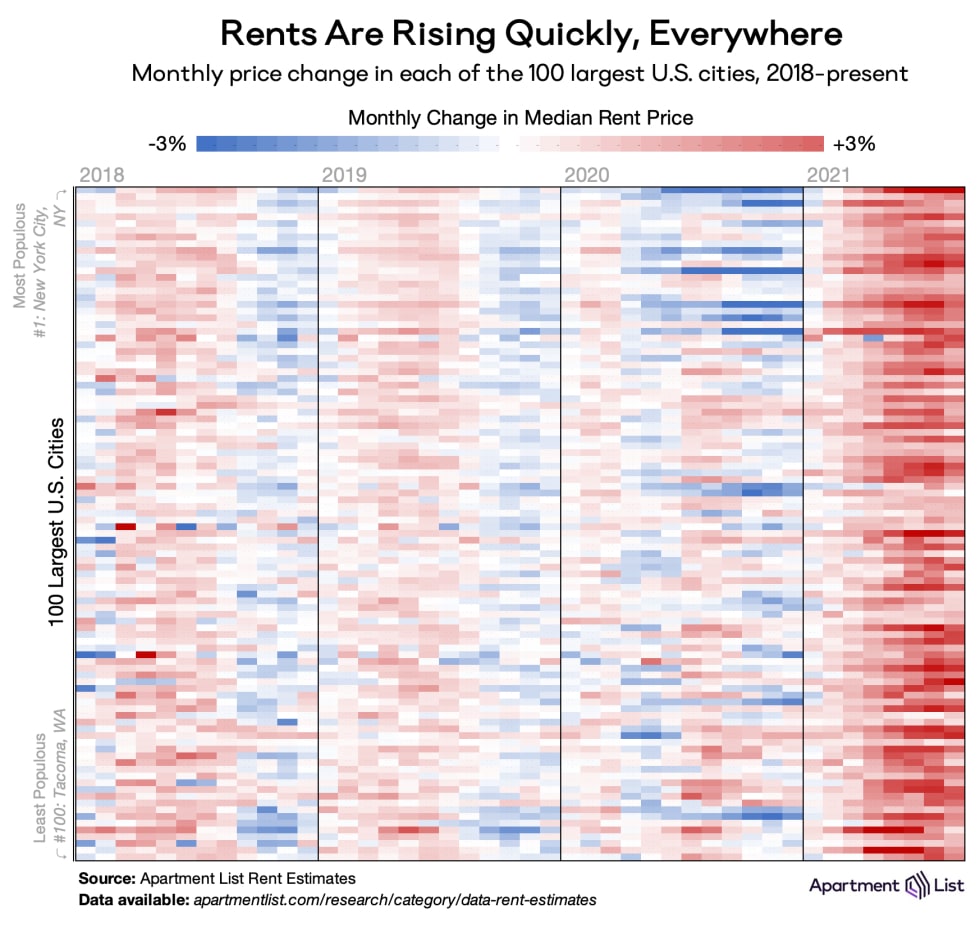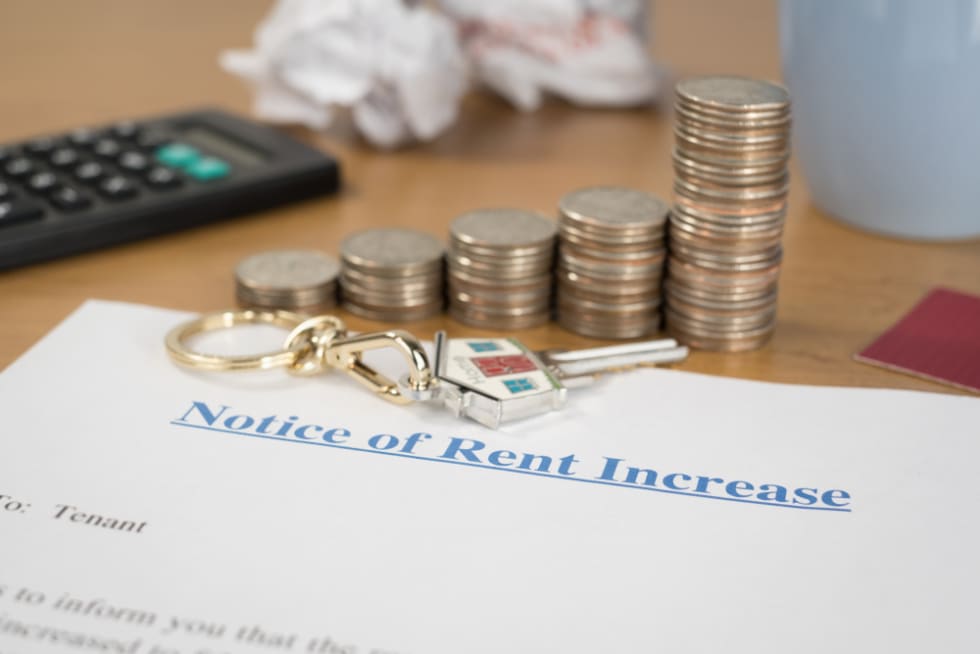Raising Rent: A Landlord's Guide to Rent Increases

To raise rent or not to raise rent? That is the question. Unfortunately, if you’re a landlord trying to navigate rent increases, things can get pretty complex pretty quickly.
Rent raises must toe a fine line so that you don’t set your unit up for an extended vacancy.
It’s a business decision with a lot of moving parts and significant consequences. However, with the right strategy for raising rent, you can end up with substantially higher profit margins.
If you’re not sure whether a rent increase is the right move for you, we’ve got you covered.
This guide will teach you everything you need to know about rent increases and how to pull one off successfully.
How Much Should You Raise Rent?
Landlords should determine how much to raise rent by assessing market trends. Understanding rent prices in your current market will enable you to set competitive rent rates that drive profit and attract tenants.
To demonstrate this, here’s a look at how rent trends in the Seattle rental market could impact a rent increase on a one-bedroom apartment.
The average cost of a one-bedroom apartment in Seattle is $2,335 monthly. Additionally, 27% of Seattle apartments cost between $2,000-$2,999 per month.
According to our Seattle rent report, Seattle rent prices have increased steadily since January 2021, including a 4.35% increase since last month.
This growth is partially attributed to the fact that rent control is illegal in Washington, a freedom that allows landlords to increase rent without limits as long as they provide proper notice.
In this scenario, a landlord in Seattle could raise rent substantially. If their unit is located in the Seattle Central Business District, rent could be nearly doubled to keep up with the rental trends.
Overall, when it comes to determining how much to raise rent — evaluate current market trends and stay up to date with current rental prices.
We can help with both.
Check out our research updates to stay informed about new trends.
How Much Can Landlords Legally Raise Rent?
The amount landlords can legally raise rent varies by location. Some states enact sweeping rent control laws that limit rent increases.
In other cases, cities take matters into their own hands and enact rent control laws to achieve the same goal.
For example, any rent increases on New York City rent-stabilized apartments must adhere to The New York City Rent Guidelines Board (NYCRGB) rent increase regulations.
However, rent increases for unregulated units in the city are negotiated between the landlord and tenant. In short, they aren’t regulated at all.
On the other side of the nation, San Francisco utilizes a rent board to regulate rent increases and limit them to set rates. In 2021, San Fransisco’s rent increase rate will be .7%.
Some states and cities have even more complex laws regarding rent increases. For example, Oregon limits rent increases to 7% plus the consumer price index from the previous calendar year.
So, be prepared to do some research and use your calculator when trying to figure that out.
When Rent Increases are Illegal
There are strict rules that govern rent increases for Section 8 housing.
Rent increases for Section 8 units are allowed, but you must be sure to follow Section 8 rent increase laws.
There have been some temporary laws enacted in light of the COVID-19 pandemic, which limits rent increases in a variety of circumstances, including Section 8 housing.
The Fair Housing Act prevents rent increases for discriminatory purposes.
How Much Does the Average Rent Increase Per Year?

National rent price trends are relatively predictable, as barring a completely unpredictable event (i.e. a pandemic), they followed seasonal trends in recent years.
From 2017 through 2019, rent rates increased steadily by 2.5% annually. Unfortunately, the pandemic caused a massive shift in the rental industry, as well as the nation’s economy as a whole.
Since the start of 2021, rent prices have increased by 12%. Compared to recent years, this growth is almost triple the normal rate.
That said, the pandemic caused rent rates to decline to record lows in 2020. This rebound doesn’t necessarily reflect exorbitant rent rates. Instead, it signals accelerated growth in a rebounding rental market.
Many local rent prices are still down tremendously from their pre-pandemic rates. As fall looms, the rental industry is expected to follow tradition with rent dips until the spring.
Luckily, there have been many signals that indicate rental market growth in the coming year.
Homeownership is too expensive for many adults in the US, renters are interested in renting again, and rental vacancies are historically low. These factors combined indicate the rental market’s stabilization and subsequent growth.
Should I Increase Rent Every Year?
As a landlord, the frequency at which you increase rent is generally up to you provided you adhere to your local laws.
However, raising rent is a business decision with many subsequent consequences.
If you raise rent too frequently, your tenants may choose not to renew their lease agreement. Additionally, you risk driving the price up so high that it’s no longer competitive in your market.
If you don’t raise rent, you may limit your profit and suffer from financial losses based on an increased cost of living in your area.
In short, raising rent is a balancing act in which a landlord has to set a price that makes financial sense without driving away tenants.
Reasons for Increasing Rent
To make an informed decision regarding rent increases, it’s important to know which events merit rent increases. To help, here’s a breakdown of some sound reasons to increase rent.
- Operating Expenses Increase: Increased operating expenses require increased revenue. This can even be a result of updates and upgrades you’ve made to the unit or building. Improving or adding amenities can mean increased upkeep and funding needs. Higher HOA fees, property taxes, or insurance premiums can all necessitate increasing rent rates to cover the additional costs.
- Cost of Living Increases: It’s no secret that the cost of living is increasing across the US. In fact, it’s a trend that can be traced back many decades. In a rental situation, landlords have the opportunity to increase their rental income by raising rent, rather than remaining stagnant and paying the costs out-of-pocket.
- Market Rate Increases: Remember that thing about remaining competitive? If the market rate for your area has increased substantially, raising rent is simply following the principle of supply and demand, as renters are snapping up units at higher rates. Even if the increase results in a vacancy, you will likely be able to rent the unit at a higher rate.

Giving Notice of Raising Rent Prices
Giving proper notice is one of the most fundamental aspects of raising rent or making any change to a lease agreement’s terms.
If you fail to provide a tenant with proper notice, your changes won’t be enacted or enforced in the court of law. This will likely lengthen the time it will take for the increase to go into effect.
At the least, you should give a tenant a 90-day notice before raising rent.
In most states, a 30-day notice is a minimum. However, this can also increase to 60 days depending on the state and type of lease agreement.
A 90-day notice will help retain compliance with your state laws and give your tenants plenty of time to decide whether they want to renew or leave. It’s a win-win.
Here’s what you should include in your rent increase notice:
- An Explanation of Why the Rent Is Increasing: As raising rent to promote discrimination is illegal, providing an explanation as to why rent is increasing helps cover your bases legally. Additionally, it adds a more personal touch to what can otherwise feel like a pure transaction or business relationship. In other words, common courtesy.
- An Offer of a Lower Increase Upon Renewal: When you increase rent, there’s always a chance that your tenant will choose not to renew their lease agreement due to cost. If you offer to reduce the proposed increase rate upon lease renewal, it may be just the incentive a tenant needs to renew with you.
Final Thoughts
Rent increases are rarely easy to pull off. However, it’s possible to successfully raise rent and retain your loyal tenants.
Unfortunately, raising rent can sometimes result in a vacancy. That doesn’t mean it was the wrong decision though!
This outcome presents the opportunity to list your unit at a higher, more competitive rate.
That said, it’s important to make the most of this opportunity by choosing the right listing platform.
Apartment List answers the call. We deliver prospective tenants who want to rent your unit, price and all. These prospects have been matched to your unit and have a higher chance of signing a lease agreement with you.
Interested in filling your apartment vacancies?
Share this Article



